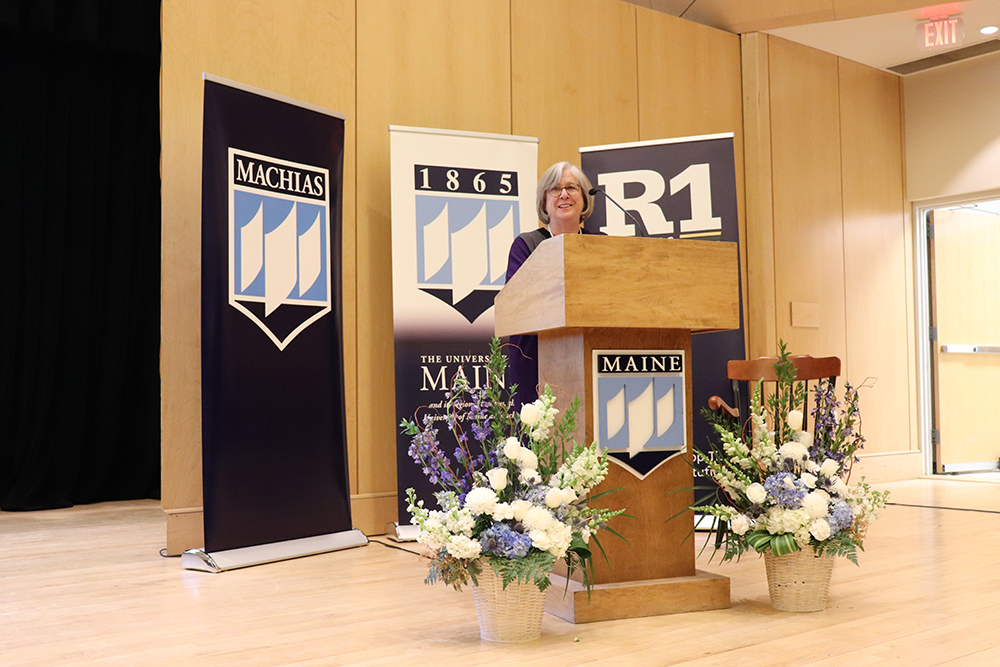The University of Maine town hall meeting on March 21 was the first budget hearing focused fully on fiscal year 2025 (FY25). UMaine President Joan Ferrini-Mundy split the discussion into three components: budget basics, plans for FY25, and the future (FY26 budget).
The UMaine 2025 Commission was launched during COVID-19, bringing attention to the role of higher education in challenging times. A few of the eight proposed focal areas include sustaining the health of our planet, advancing research and teaching and growing a thriving and inclusive community of learners.
A three-year budget plan, accepted by the Board of Trustees (BoT), is nearing the end of year one. By 2026, the University is set to complete its efforts to balance the budget and avoid withdrawing from reserves (savings account).
Ferrini-Mundy went through the basic planning cycle for FY24 to show the processes that each UMaine budget undergoes. Firstly, efforts in enrollment for the class that begins in 2024 were initiated in the spring of 2023. FY23 closed officially in July. Planning and projections went underway within departments, schools, colleges and cabinets in the fall. At the start of 2024, campus-wide budget hearings took place. Many of these involved leaders from colleges and research institutes to hear plans to balance.
This month, the UMS Preliminary Budget was submitted to the Finance, Facilities and Technology committees of BoT for review. Moving forward, UMS-wide approval is anticipated in May. FY25 begins in July 2024. Ferrini-Mundy emphasized that the budget for FY25 was recently proposed and remains unofficial as it stands.
“There can be challenges and questions and issues and a lot of changes over time. I tell you all this to say that the more we can all appreciate the budget timing process and recognize that planning, which we need to do now for Fiscal 26, can be open only to a point. Then we start to have to narrow down the conversations,” said Ferrini-Mundy.
The Education and General (E&G) expense budget is approximately $273.3 million. The four primary revenue sources include $105.4 million in state appropriations, $124.8 million in tuition and fees (net of financial aid), $22.2 million from indirect cost returns on research grants and sales, and lastly, $16 million in service and auxiliary revenues.
The three primary expenditures are compensation and benefits for $177.1 million, capital maintenance and energy for $28.6 million and other expenses for $67.6 million. While the expenses outpace revenues, UMS is making progress toward balancing the budget. It focuses on decreasing expenses and finding efficiencies.
Chief Financial Officer Kelly Sparks shared the three-year E&G budget targets. They would Increase net revenues by about 6.3% and total expenses by nearly 5%. In 2024, $7.6 million was pulled from reserves. Under the plan, $4.6 million will be used in 2025 and $2.1 million in 2026. UMS anticipates the reserves will be down to $49.2 million. In FY22, they were at $86.5 million.
A third-party consortium recommended that an average of $30 million be spent per year on maintenance as part of the UMS investment in infrastructure renewal. With the $4.8 million in additional state appropriations secured by Janet Mills, the new revenue increase across all categories is $9.5 million.
Total student credit hours for undergraduate and graduate students will decrease by 2%. The smallest number of students throughout the last decade is entering in fall 2024. However, UMaine is over 35% ahead in total matriculated students.
The FY25 budget proposed an increase in tuition and fees. A 3% increase in base undergrad tuition would take place system-wide. Differential tuition is also facing restructuring, specifically within the business, engineering and nursing fields. The changes will apply at a semester level and shift to a per-course student differential tuition where the cost of delivery is higher than other programs.
The technology fee will also be increased for infrastructure support and deferred maintenance. The classroom wing of Bennett Hall will undergo HVAC system replacement. Also, UMS intends to reinstate the online course fee to support the quality of programs and expand offerings.
Sparks also discussed certain proposed efficiencies to accommodate a smaller population, with the higher-populated Class of 2024 graduating in May. One of these is helping achieve UMaine’s carbon commitment goals. In FY25, UMS is looking to remove 93,000 square feet from the Orono campus in small, scattered increments. Some buildings in York Village, the Francis Allen Black Hall and other infrastructures will be torn down. LED lights will be introduced around campus. As a result of both initiatives, UMS saves 1.6 million in fuel and electricity.
“Those folks that may be impacted or moved, many moves have already started to happen over the last year that is preemptive of this and other groups that may potentially be impacted, we are in the process of discussing relocation and new options for them,” said Sparks. “The good news is, as people move, we are able to update furniture, we are able to update and refresh some of those spaces.”
The President’s Budget Advisory Committee was formed, and its first meeting was held there. The committee seeks to familiarize people with how the budget works and consider “responsibility-centered management.”
More in-depth and specific town hall discussions will be offered on various topics. For example, auxiliary enterprises, including housing, dining, printing, mailing and parking. Other potential categories are space and capital infrastructure, academic program portfolio assessment, costs and benefits as a research university and state appropriation and legislative engagement.








